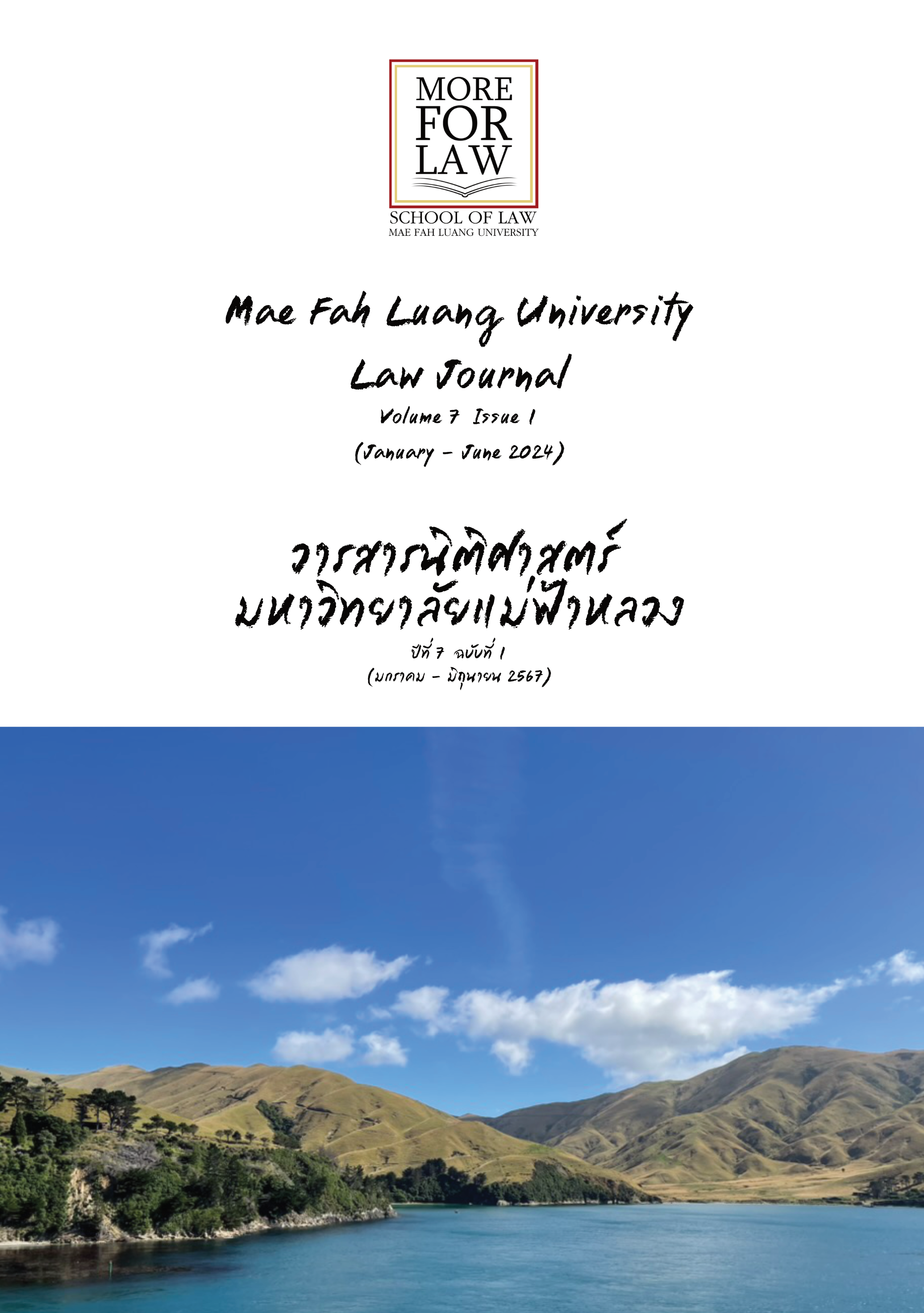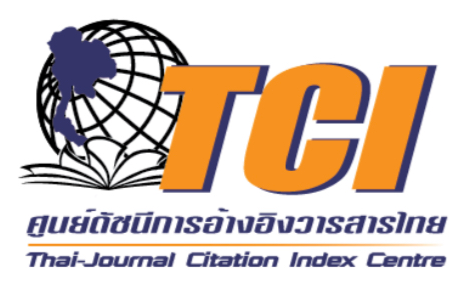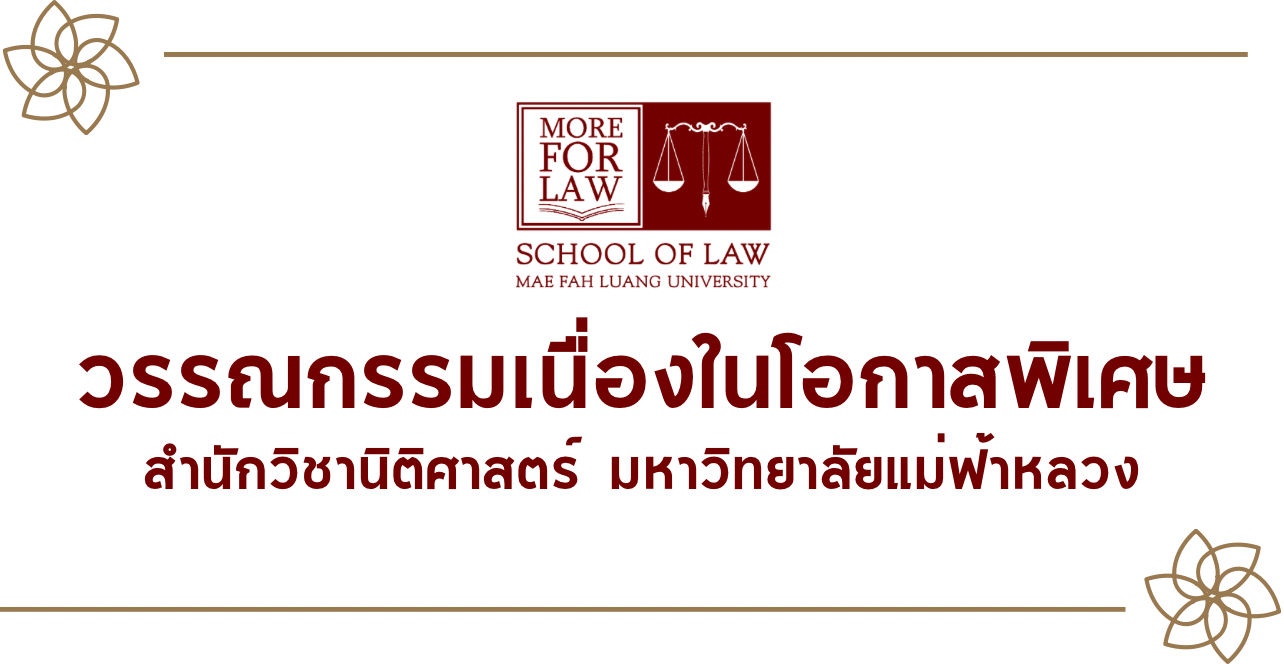The Review Mechanism of the Public Prosecutors’ Discretion in Making Non-Appeal Orders: The Case Study of the Criminal Procedure Code Section 145 and 145/1
DOI:
https://doi.org/10.14456/mfulj.2024.7Keywords:
The Review Mechanism of Public Prosecutor’s Discretion, Appeal The Criminal Cases to the Appeal Court or the Supreme Court, Public ProsecutorsAbstract
According to the Constitution of the Kingdom of Thailand B.E., 2560 Section 68 states that “The State should organise a management system of the justice process in every aspect to ensure efficiency, fairness, and non-discrimination and shall ensure that the people have
access to the justice process in a convenient and swift manner without delay and do not have to bear excessive expenses…”. Moreover, Section 258 (d) (1) (2) also provides that the National reform shall be carried out to at least achieve the Justice Process by ensuring that time limits
for the justice process at every stage are clearly specified so that justice is delivered to the people without delay, together with improving the system of a criminal inquiry by providing a proper check and balance between inquiry officials and public prosecutors. At present,
however, a judicial process in the review mechanism of the public prosecutor's discretion in making non-appeal orders to the Appeal Court or the Supreme Court, for instance, the process in the Criminal Procedure Code Section 145 and 145/1, are still not in accordance with the spirit of the Constitution, both in terms of the determining an organisation with authority to scrutinise and the delay in such scrutiny. As a result, the review process is inconsistent with the checks and balances principle. Furthermore, it also affects the rights and liberties of the defendant, especially in cases where the court dismissed the case yet ordered the detention of the defendant pending appeal, in order to wait for the delay related to the discretionary review of the prosecutor's non-appeal order. The defendant, subsequently, was imprisoned for longer than necessary. This thesis, therefore, studies and analyses the concepts and theories related to the prosecutor's discretion, discretion reviewing, and appeal order in criminal cases, together with the review mechanism of the public prosecutor's non-appeal discretion under foreign legislation, in order to provide the appropriate form and approach of a review mechanism of the prosecutors’ discretion in making non-appeal orders under the
Thai legal system.
Downloads
References
โกนเมน ภัทรภิรมย์, การฟ้องคดีอาญาในประเทศฝรั่งเศส ใน ชีวิตและผลงานโกนเมน ภัทรภิรมย์, บรรณาธิการโดย รังสิชัย บรรณกิจวิจารณ์ (กรุงเทพมหานคร: ศรีสมบัติการพิมพ์, 2536).
คณิต ณ นคร, อัยการเยอรมันและการดำเนินคดีอาญาของอัยการเยอรมันก่อนฟ้อง ใน รวมบทความวิชาการของ ศ.ดร.คณิต ณ นคร, บรรณาธิการโดย สหาย ทรัพย์สุนทรกุล (กรุงเทพมหานคร: ห้างหุ้นส่วนจำกัดพิมพ์อักษร, 2540).
ชาญณรงค์ ปราณีจิตต์ และคณะ, การวิจัยเพื่อลดปริมาณคดีที่มาสู่ศาลอุทธรณ์และศาลฎีกา, (รายงานวิจัย), (กรุงเทพมหานคร: 2544).
ธานินทร์ กรัยวิเชียร และวิชา มหาคุณ, การตีความกฎหมาย, พิมพ์ครั้งที่ 2 (กรุงเทพมหานคร: สำนักพิมพ์ชวนพิมพ์, 2523).
ธานิศ เกศวพิทักษ์, คำอธิบายกฎหมายวิธีพิจารณาความอาญา เล่ม 1, พิมพ์ครั้งที่ 13 (กรุงเทพมหานคร: บริษัท กรุงสยาม พับลิชชิ่ง จำกัด, 2559).
นิษฐนาถ คงนวล, การตรวจสอบอำนาจอิสระของพนักงานอัยการภายใต้รัฐธรรมนูญแห่งราชอาณาจักรไทย พุทธศักราช 2550: ศึกษากรณีการสั่งคดีตามดุลพินิจ, (วิทยานิพนธ์ปริญญามหาบัณฑิต หลักสูตรนิติศาสตรมหาบัณฑิต คณะนิติศาสตร์ มหาวิทยาลัยธุรกิจบัณฑิต, 2555).
ประเสริฐ โหล่วประดิษฐ์, ปัญหาการอุทธรณ์คำพิพากษาศาลฎีกาแผนกคดีอาญาของผู้ดำรงตำแหน่งทางการเมือง: ศึกษากรณีการทบทวนคำพิพากษา, (เอกสารวิชาการส่วนบุคคล หลักสูตรผู้พิพากษาศาลชั้นต้น สถาบันพัฒนาข้าราชการฝ่ายตุลาการศาลยุติธรรม, 2546).
ปริญญา จิตรการนทีกิจ, หลักกฎหมายวิธีพิจารณาความอาญา เล่ม 1, (กรุงเทพมหานคร: สำนักพิมพ์วิญญูชน, 2549).
ศิระ บุญภินนท์, อัยการญี่ปุ่น ระบบอัยการญี่ปุ่น: แนวคิดและทิศทางในการปฏิรูประบบอัยการไทย, เอกสารประกอบการบรรยายพิเศษ 23 มกราคม 2540. (เอกสารไม่ตีพิมพ์เผยแพร่)
ศิระ บุญภินนท์, การควบคุมดุลพินิจอัยการในประเทศญี่ปุ่น, วารสารกฎหมายสุโขทัยธรรมาธิราช ปีที่ 10 ฉบับที่ 1 (มิถุนายน 2541).
ศิริชัย พลการ, บทบาทของอัยการในการตรวจสอบกระบวนการยุติธรรม, (วิทยานิพนธ์ปริญญามหาบัณฑิต หลักสูตรนิติศาสตรมหาบัณฑิต คณะนิติศาสตร์ มหาวิทยาลัยธุรกิจบัณฑิตย์, 2550).
สมบัติ ธำรงธัญวงศ์, การเมือง: แนวความคิดและการพัฒนา, พิมพ์ครั้งที่ 15 (กรุงเทพมหานคร: สำนักพิมพ์เสมาธรรม, 2548).
อดิศร ไชยคุปต์, ดุลพินิจของพนักงานอัยการในการสั่งไม่ฟ้องคดีอาญา, (วิทยานิพนธ์นิติศาสตรมหาบัณฑิต หลักสูตรนิติศาสตรมหาบัณฑิต คณะนิติศาสตร์ มหาวิทยาลัยรามคำแหง, 2542).
อุทัย อาทิเวช, การมีส่วนร่วมของประชาชนในกระบวนการยุติธรรมทางอาญา: ตัวอย่างของระบบลูกขุนฝรั่งเศส วารสารผู้ตรวจการแผ่นดิน ปีที่ 2 ฉบับที่ 2 (กรกฎาคม-ธันวาคม 2552).
Anke Frechmann and Thomas Wegerich, The German Legal System (London: Sweet & Maxwell).
David A Jones Little, The law of criminal procedure: an analysis and critique, (Boston: Little Brown and Company, 1981).
Hans-Heinrich Jescheck, The Discretionary Powers of the Prosecuting Attorney in West Germany, The American Journal of Comparative Law, Volume 18 Issue 3 (1970).
Hideo Tanaka, The Japanese Legal System, (Tokyo: University of Tokyo Press, 1976).
Jay A.Sigler, The Prosecutor: A comparative Functional Analysis, in The Prosecutor, ed. William F. McDonald (California: Sage Publications, 1979).
Joachim Herrmann, The Rule of compulsory Prosecution and the Scope of Prosecutorial Discretion in Germany, (The University of Chicago Law Review, 1974).
Klaus Sessar, Prosecutorial Discretion in Germany, in The Prosecutor, ed. William F. McDonald (California: Sage Publications, 1979).
Mariann Loschnig-Gspandl and Michael kilching, Victim Offender Mediation and Victim Compensation in Austria and Germany-Stock Taking and Perspectives for Future Research, European Journal of Crime, Criminal Law and Criminal Justice Vol.58 (1997).
Shigemisu Dando, The Japanese Law of Criminal Procedure, (Trans B.J.South Hackensack: Fred 3 Rothman Co, 1965).
Downloads
Published
How to Cite
Issue
Section
License
Copyright (c) 2024 Mae Fah Luang University Law Journal

This work is licensed under a Creative Commons Attribution-NonCommercial-NoDerivatives 4.0 International License.






